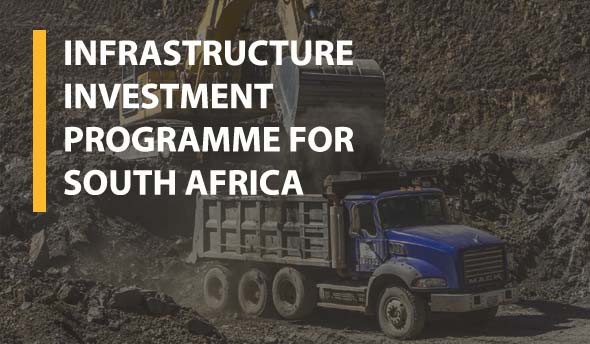In line with the National Development Plan Vision 2030 and fourteen MTSF outcomes, infrastructure investment remains key fundamental for long term, sustainable growth and development. To achieve sustainable growth by 2030, South Africa needs to invest in a strong network of economic infrastructure designed to support the country’s medium and long term objectives. Achieving this vision is possible if there is targeted development of transport, energy, water resources and information and communication technology (ICT) networks. The Infrastructure Sector deals with management of development cooperation in support of infrastructure development essential for sustainable and inclusive growth and development. The key priority for the sector is therefore to ensure that development cooperation contributes toward the following government outcomes: | Outcome 6: | An efficient, competitive and responsive economic infrastructure network, | | Outcome 7: | Vibrant, equitable and sustainable rural communities with food security for all, | | Outcome 8: | Sustainable human settlements and improved quality of household life, | | Outcome 9: | A responsive accountable effective and efficient local government system, | | Outcome 10: | Environmental assets and natural resources that is well protected and continually enhanced, |
To advance the work within this sector, engagements take place with relevant key departments such as Science and Technology, Transport, Public Works, Water, Environment, Communications, Public Enterprises, Transport, Human Settlements, and Energy. The key State Owned Companies within this sector such as the Development bank of Southern Africa, Land Bank, National Research Foundation, Council for Scientific Industrial Research, the various water boards, the Housing Development Agency, Eskom and the South African National Energy Development Institute, work within the Development cooperation arena. | |  Taking into account priorities of government, together with the specialized interests of the development partners, support for development cooperation within these sectors is mainly within the following sub sectors: Environment & Natural Resources:- Climate Change
- Environment Protection
- Biodiversity
| Infrastructure:- Transport, Roads & Ports
- Water
- Energy
- Communication
- Housing
- ICT
|
Since 1994 there has been various programmes supported through development cooperation within the infrastructure sector. These include programmes such as the Mashibambane Water programme, Innovation for Poverty and Cooperation of various renewable energy and efficiency projects, and the Infrastructure Investment Programme for South Africa (IIPSA). Support within this sector has been historically in the form of grants, technical assistance and concessionary loans. Within the energy and environment sectors, there has been substantial support in the form of Technical Assistance to support South Africa’s transition to the use of renewable energy and climate change initiatives. Currently, there is large investment programme that would show case the use of blending of grants with concessionary loans within Development Finance Institutions for infrastructure development. |